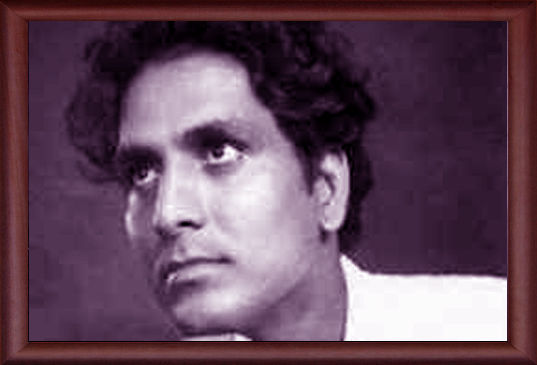Hasrat Jaipuri was born in Jaipur, Rajasthan as Iqbal Hussain, on April 15 1922. He attended Muslim school of Jaipur, where he studied English with other subjects. He studied and acquired his 'taalim' in Urdu and Persian from his learned grandfather, Fida Hussain. He began writing verses at very young age. Poetry came to him as a gift from God. When he was 20, he fell in love with a neighborhood girl called Radha. According to Hasrat "Love knows no mazhab or dharam..". He said "It is not at all necessary that a Muslim boy must fall in love only with a Muslim girl. My love was silent, but I wrote a poem for her, 'Yeh Mera Prem Patra Padh Kar, Ke Tum Naaraaz Na Hona..', And that 'letter' may never have been delivered to Radha, but Raj Kapoor later delivered it to the world as the perennial mantra for lovers of all generations in his Sangam (1964)."
Hasrat came to Bombay in 1940 in search of some job. Hasrat took the secure job of a bus conductor and satiated his creative urges by participating in mushairas. The late Prithviraj Kapoor heard his verses in a 'Mushaira' and recommended him to his son Raj Kapoor who was planning a musical love story with a upcoming music director duo,
Shankar-Jaikishan. "We met at the canteen of the Royal Opera House where Prithvirajji used to stage his plays, and Rajji signed me for Barsaat. My first recorded song was 'Jiya Beqaraar Hai..' tuned by Shanker, the second was 'Chhod Gaye Baalam..', my first song with Jaikishan, and my first duet", recalls the great romatic poet.
The association of Raj Kapoor, Hasrat and
Shankar-Jaikishan continued till 1971. After Jaikishan's death and the failures of Mera Naam Joker and Kal Aaj Aur Kal, Raj Kapoor changed his music team. But Raj wanted to call Hasrat back for Prem Rog. That did not work out because someone recommended Amir Qazalbash to Raj Kapoor. But Hasrat was back with 'Sun Sahiba Sun..' which Raj Kapoor told him to write to one of his own tunes which he had used as the English song "I love you" in Sangam. Raj Kapoor then called Hasrat for three songs for Henna, but after Raj Kapoor's death, the music director conspired to scrap them and replace them with his own lyrics.
Hasrat won innumerable awards, honours and mementos. Among them were two
Filmfare trophies (for 'Baharon Phool Barsao..' from Suraj and 'Zindagi Ek Safar Hai Suhana..' from Andaz) and two awards - the Doctorate from the World University Round-Table and the Josh Mahilabadi award from the Urdu Conference for his literary work as a poet. Also the Dr Ambedkar award for a film song, 'Jhanak Jhanak Tori Baaje Payaliya..' from Mere Huzoor, which was written with a blend of Hindi and Brij Bhasha. Apropos that, the poet once said, "Hindi and Urdu are like two great and inseparable sisters. Even my books on poetry are in Hindi as well as Urdu." His latest published compilation was "Abshaar-E-Ghazal."
About 350 films and 2000 recorded songs old, Hasrat's last releases were Mr. & Mrs. Khiladi and Sher Khan, and at the time of his death he was working on a few small films and a book of shaayari.

